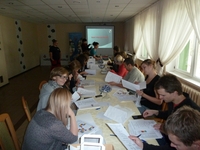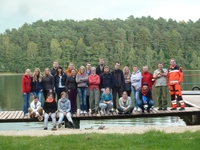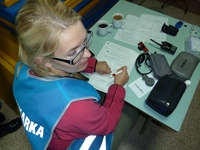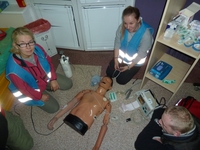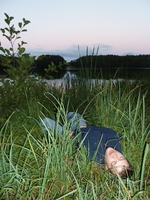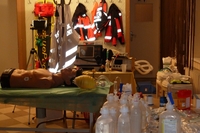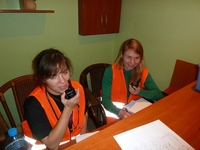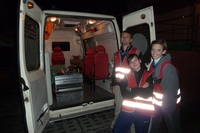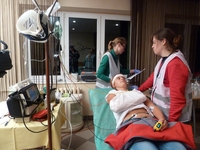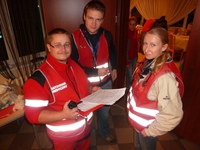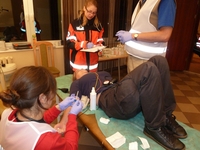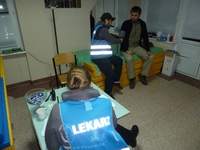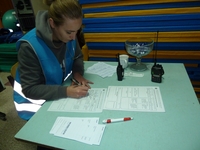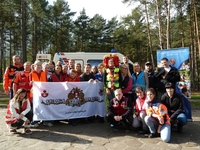Learning the secrets of saving lives
16.10.2013
During the last weekend of September 2013, young doctors from the Tricity region participated in an innovative training organized by the Regional Medical Chamber in Gdańsk and the MUG Department of Emergency Medicine led by prof. Andrzej Basiński. The training “Young doctor in an ambulance – how to get rid of your fear” combined learning with fun and reminded the participants about the basic approach to patients in life-threatening situations. The organizers intended this training as a realistic simulation of the work which young doctors face every day, using hands-on scenarios with live patients and sometimes mannequins.
The idea for this training was born in the minds of a team of doctors and paramedics who have been conducting hands-on training for the students of the MUG paramedic program. Remembering their own first weeks on the job and working with other new doctors, they agreed that similar training would reduce the stress of young doctors working at an after-hours clinic, where they frequently work. Furthermore, such training would be the best way to encourage young doctors to specialize in the challenging and interesting field of emergency medicine.
The September training was the result of several months of intensive preparations by Anna Ingielewicz, Łukasz Skorupa (both doctors at the MUG Department of Emergency Medicine), Dawid Barbużyński, Krzysztof Flis (both paramedics) and Karolina Wiśniewska-Skorupa (specializing in family medicine). The preparations were supervised by prof. Andrzej Basiński, dual specialist in emergency medicine as well as anesthesiology and intensive care.
The training was conducted during day and night hours. The twenty participants were divided into teams of 2-3 and were assigned to shifts at an emergency room, an after-hours clinic and a medical rescue team. Participants switched roles from doctors/team leaders to nurses, paramedics and even emergency dispatchers. This way they learned the scope of responsibilities of all the units of the emergency medical system.
Every participant wore a reflective vest defining his/her role in the scenario and was able to use real medical equipment, including a fully-equipped ambulance. In addition to examining and treating their patients, the participants were also required to complete medical documentation and maintain radio communication with the other teams.
The outcome of this training exceeded the organizers’ expectations. The strong involvement of the participants, the atmosphere at the training site and the instructors’ experience made it possible to simulate the world of emergency medicine in which the patients received several levels of medical care. Thanks to this, the participants gained maximum knowledge and experience.
“This training was far beyond the typical CPR training with mannequins in the classroom. This time we trained with live patients. The organizers provided realistic patients and scenarios. We used real equipment and did practically all the procedures and handling on the real patients,” said one of the participants after returning from the course.
“For the first time I had the opportunity and was required to act from the beginning of the emergency call, to perform even the smallest procedures at the site of emergency, to use my knowledge in hands-on situations and most importantly: to make decisions. The chance to get exposed to real work and to learn from own my mistakes is priceless,” summarized an intern doctor.
Due to the positive feedback from the participants, the lack of such training opportunities on the market and seeing the continued need for practical training for young doctors, the organizers hope for the continued support of this project.
Archives
- Academic Year 2024/2025
- Academic Year 2023/2024
- Academic Year 2022/2023
- Academic Year 2021/2022
- Academic Year 2020/2021
- Academic Year 2019/2020
- Academic Year 2018/2019
- Academic Year 2017/2018
- Academic Year 2016/2017
- Academic Year 2015/2016
- Academic Year 2014/2015
- Academic Year 2013/2014
- Academic Year 2012/2013
